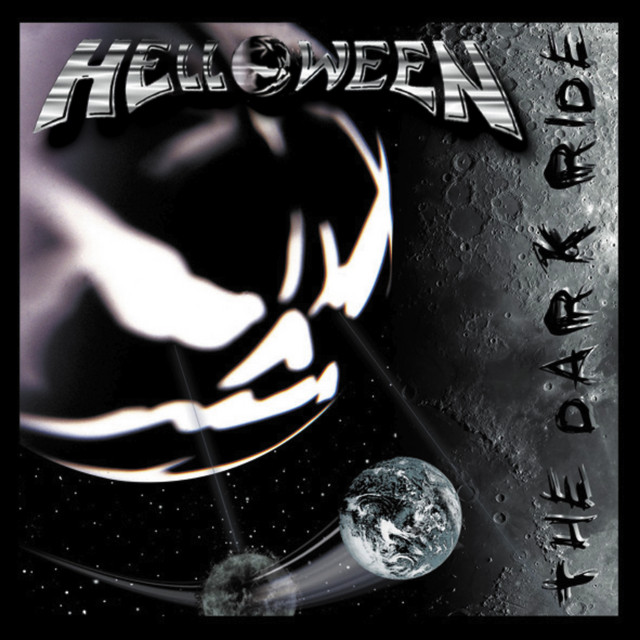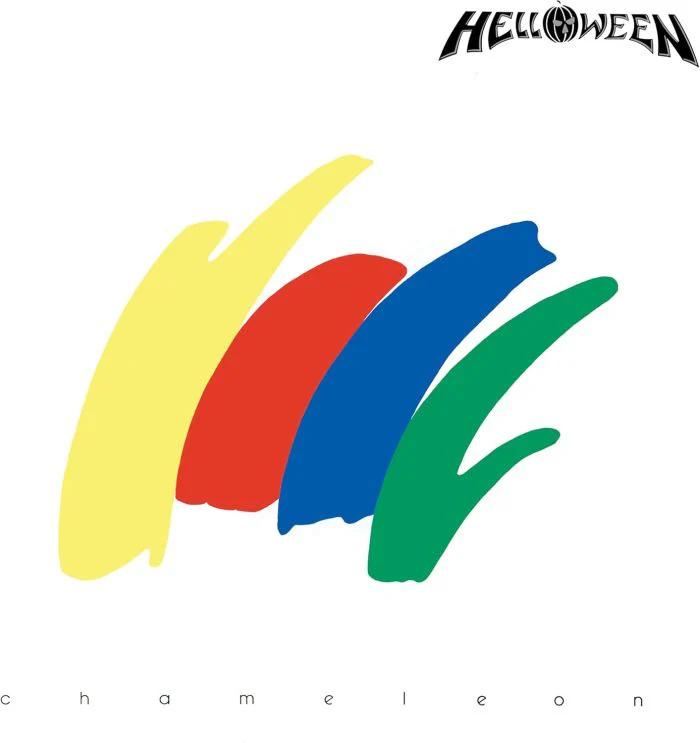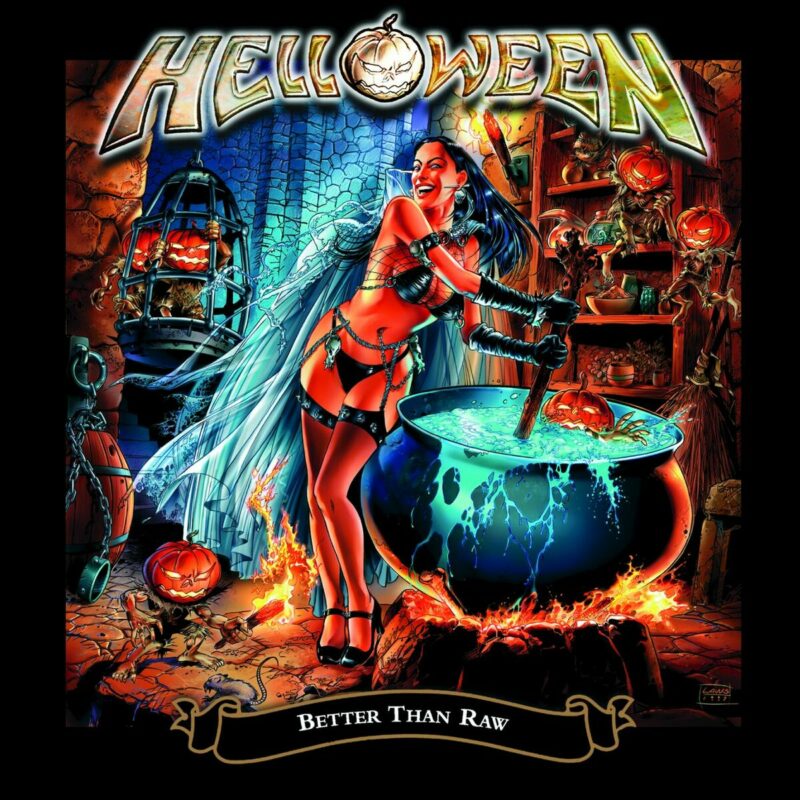
The end of an era. Helloween’s Y2K album is the last to feature the second “classic” lineup of Weikath/Deris/Grosskopf/Grapow/Kusch. It marks a turning point: post-The Dark Ride, Helloween becomes, though not bad, more streamlined, less risk-averse, and (in my view) less interesting.
To dispatch with the obvious, no, this isn’t “nu metal” Helloween. It has some downtuned, tonally dark songs, but they mostly seem patterned after Dio/Martin-era Black Sabbath more than, say Korn.
It’s definitely confused. I’ll say that much. The band doesn’t fully commit to their new, dark style, writing a bunch of classic-style songs as well, turning the album into a bit of a patchwork. The Dark Ride is an odd, contradictory amphibian of an album that seems to exist in the sunlight and under the starless sky at the same time, with the tracklisting throwing every tonal mismatch into sharp relief. You have basically the floweriest song ever written under the Helloween imprimature (“All Over the Nations”) right next to arguably the darkest one (“Escalation 666”). “Mr Torture” is a perfect opening, “The Dark Ride” a perfect closer, but otherwise you could jumble the songs at random and get a more cohesive listening experience.
Grapow/Kusch really start driving the band here—to their detriment, as creative conflicts would soon lead to them being ousted (Grapow, 2005: “We weren’t really a band anymore and struggled with tons of issues along the way, it was best for us to leave and aim for new goals.”). They write a ton of songs, and according to Grapow, virtually all the guitar work here is his. At the same time, they were also amassing some songs that never made the album, and were later featured on the debut album of their next band, Masterplan. (You can really imagine “Into the Light” on this album, being sung by Deris.)
Kusch’s “Mr Torture” is one of the all-time Helloween opening songs. Punchy, tight, catchy, accessible, it rolls and bounces along, verses propelled by jagged runs of double-bass, the chorus opening wide up, and the bridge illuminated by a short but flashy Grapow guitar solo that lights the song on fire. Great track.
The lyrics are pretty weird, portraying some kind of…torture entrepeneur? “You can catch him on his website / Has a live chat every weeknight / Cyber-torture soon coming your way!” Well, it wouldn’t be a year 2000 album without gratuitous internet references, I suppose. (Viz Britney Spears’ “Email My Heart”)
Then Weikath’s “All Over the Nations” arrives: a fast, melodic, somewhat generic power metal track, it sounds literally nothing like the preceding or following song. Other than Deris’s vocals and Roy Z’s murky but textured production (which proves to be the glue holding The Dark Ride‘s disparate shards together), you wouldn’t even think this and “Mr Torture” were from the same album. Not offensive, but definitely a bit lightweight and “Helloween done by committee”.
Two things are noticeable about The Dark Ride: first, it’s really, really good. Possibly superior to Better than Raw, which might make it the best Helloween album ever, aside from Walls of Jericho and The Keepers.
Second, the different songwriters are really, really, really not on the same page anymore. Grapow and Kusch want darkness, Weikath stubbornly cleaves to the “happy happy Helloween” template, and Deris has a foot in both camps. Markus Grosskopf sticks to playing bass, and doesn’t write a song this time (although his composition “Deliver Us” appears on various bonus editions, and suggests he was of one mind with the Grapow/Kusch contingent.)
Grapow’s “Escalation 666” is one of the band’s most crushing and experimental tracks. A doom metal paced trudge through some inner mindscape of madness, it’s not a song, it’s a black hole yawning at the album’s core. The chugging, C-standard (I think?) opening riff sounds supernova-heavy, and the dissonant, effects-laden guitar solo reminds me of “Bleeding Eyes” off that first Masterplan album. It’s not the greatest song on the album, but it’s never far from my thoughts.
Andi Deris proves to be hit or miss like usual, writing two certified classics (the piano-driven single “If I Could Fly” and the flighty, foot-on-the-gas adventure of “We Damn the Night”) and two stinkers. “Mirror Mirror” and “I Live For Your Pain” are just chuggy, downtuned nothingburgers with mediocre ideas and no sense of catchiness or energy. Skip-button fodder. Like Helloween trying to be a grunge rock band or something.
His bonus track “Madness of the Crowds” is a fascinating “one idea” type song, pairing quiet verses with explosive choruses (and some intriguing knifing symphonic stabs). “Immortal” is the closest we have to a torch ballad. Not bad, but a bit slender when compared with Kusch’s “The Departed”, which we just heard a few minutes earlier.
The album concludes with Grapow’s “The Dark Ride”, a monolithic speed epic that’s like a tombstone for this era of the band. Beginning with the (somewhat stale) motif of amusement park sounds, it’s a bit long, but when the ideas come, they really come. Grapow really loves octave-skipping tremolo riffs (like in the pre-chorus: “Out of doubt, no hope / Satan feeds our madness”), but so do I. The guitar solo section is just straight-up Yngwie Malmsteen worship. Some of the last he ever did.
This is one of those spikey albums where the flaws are evident but the strengths are so good that even if I’m bitching about it half the time, I still love it. This is an incredibly special and important record to me. One last triumph of power metal before Y2K shut the world down.

A miserable listen. One of the most violently wrong-sounding albums I own. It captures a band ready to break up, and its silly melodies and forced-happy tone gives it a tragicomic “fiddling on the Titanic” tone. The singer was fired three months after its release, and a year after that the drummer jumped in front of a train.
It’s the only Helloween album that gives me no way in, the only one where the question “what were they trying for here?” has no clear answer. The title and cover suggests a band making a statement for artistic diversity: for breaking out of the power metal ghetto, for doing the unexpected. But “weird” is an adjective, not a noun. An approach, not an identity. You can’t have a band founded on sonic diversity and nothing else: that simply means you don’t have a sound. The cover sums things up—it’s colors for the sake of colors, not actually a painting of anything.
In practice, Chameleon is a three-way solo album between singer Michael Kiske and guitarists Michael Weikath and Roland Grapow, who are now apparently communicating through lawyers who end every correspondence with “conduct yourself accordingly”. The hostility in this hate triangle is palpable, and bleeds through on the record. None of them like or respect what the other two are doing, and at times they almost seem to be sabotaging each other. Also present are the ever-reliable bassist Markus Grosskopf, who does what he can, and drummer Ingo Swichtenberg, whose paranoid schizophrenia was sadly worsening, and who clearly hates the Beatles- and Queen-influenced songs more than anyone.
It’s horribly overproduced, and an example of how money can’t make bad music good. Songs like “In the Night” are overwrought and overthought, packed with vocal and guitar and saxophone (?) overdubs to disguise how weak they are. Synthesizers prove a particularly hateful presence: even good songs like “Giants” and “I Believe” have cheesy bleep-bloopy one-finger Fairlight arpeggios on them, of the sort you normally hear on Huey Lewis songs. Abominable. If you’re ripping off Queen, couldn’t you also rip off the “No Synthesizers” sleeve notes?
Michael Weikath’s songs have the largest quality delta. “First Time” is an okay hair metal song that passes without much pain. “Giants” is actually a minor classic, and would have fit well on either Keeper album. It has a heavy as hell NWOBHM-influenced main riff, and the chorus is sublime. “Don’t you, won’t you, say that we’ll be free again!” On the other hand, “Revolution Now” is a droning 70s Jimi Hendrix knockoff that’s eight minutes long. It sounds like Oasis’s Be Here Now, and is equally boring. “Windmill” (or “Shitmill”, in Ingo’s memorable term) is the worst ballad ever written by the band: rank, rancid, and insipid.
Roland Grapow’s songs are largely dull. “Crazy Cat” has some big band flash but no good hooks. You’d have to pay me to listen to “I Don’t Wanna Cry No More” again. “Music” has a Pink Floyd-inspired bridge with some fine single-coil Strat guitar soloing, but otherwise is as unmemorable as its title implies. “Step Out of Hell” is filler burdened with yet more synth cheese.
Michael Kiske was never the band’s greatest songwriter. Here, he offers a surprise in “I Believe”, an emotionally bludgeoning but effective ode to faith that’s nearly a masterpiece. It has some wonderful ideas in the Iron Maiden/Manilla Road vein (ironically, he’d soon swear off heavy metal entirely), but it’s just too long and draggy. It needed some tempo changes in the middle. Still, I think this might be the album’s finest track. “When the Sinner” is overlong and mediocre at best, and is overloaded with questionable ideas (if you’re one of the millions of fans who thought “Helloween would sound much better with alto sax solos”, then I’ve got the album for you.) The Paul McCartney-esque “In the Night” is just too sonically confused to stay in the memory.
Not only did Helloween tear to shreds what made them successful, they replaced it with…nothing. Just shallow, derivative imitations of other bands and styles. Chameleon has two good songs and ten bad ones, with saxophones and synthesizers. At times it seems like a practical joke. At least they released it in 1993, when the world’s appetite for retro-progressive dad rock was at an all time low. The album’s title feels appropriate: it was literally invisible.

What does the title mean? That, I can’t tell you. It’s an excellent power metal album, however. Time of the Oath was 25% better than Master of the Rings; Better than Raw is 25% greater again. Everything locks into place here. Music, tone, style, production, performance. It’s distinct from anything Helloween made before, yet feels like a summation and endpoint of their 90s style: great songs, performed with panache and energy. Helloween wasn’t just out of “comeback hell” in 1998, they producing melodic power metal that compared decently against their classic 80s run (Walls of Jericho plus Keeper of the Seven Keys I and II).
All of the musicians more than pull their weight, but one of them steals the show. Uli Kusch’s drumming is so damned good here—flashy and technical, yet in-the-pocket and lively. Listen to the way he anchors the start of “Push”—tight triplets on the kicks, with sharp, precise hats punching Markus Grosskopf’s bubbling bass into place like steel tentpegs—or the unyielding chaos of “Midnight Sun”—where flurries of wild snare and tom fills swoop and overtake each other like crazed birds. He adds such interesting skeletons to fairly average midpaced fair like “Hey Lord!” that they seem absolutely compelling.
This might be the most balanced Helloween album from a songwriting perspective. Four songs by Uli, four by Weikath, four by Deris. This is the only 90s Helloween album to have absolutely no songs credited to lead guitarist Roland Grapow, but I happen to know he “ghosted” a fair bit on Uli’s songs. The staccato guitar riff in “Revelation” was written by him, for example.
“Push” is fast. “Falling Higher” is even faster. Tommy Hansen’s production is dated, archaic and rough, with bits of dust seeming to cling to the cracks in every note. I think this was the last time they ever worked with Hansen, and represents another breaking point with their classic power metal style. Subsequent albums had a more modern (sometimes too modern) sound.
There are some recondite progressive rock touches in the album’s second half, which, unlike Chameleon, are well done and don’t seem too distinct from the band’s core style. “Time” and “A Handful of Pain”.
The worst song is probably Weikath’s “Lavdate Dominum”, which listens like a goofy punk rock song, or a heavy metal cover of some Christmas carol. I don’t know what the idea was here. He also gets the album closer, “Midnight Sun”, which is really good; extremely lengthy and technical while also fraught with emotional agitation. One of Deris’s great vocal tracks is on this song.
There are two great songs, that are pretty much in the top 10 greatest Helloween tracks every time I make a list. The first is Uli Kusch’s “Revelation”, an amazing, warp-speed epic that seems to be a jaded postmodern take on the Bible. Astonishing shifts in feel and tempo, solo after solo, weird digressions into funk rock and thrash, the album’s greatest chorus…Worlds form, collide, and break apart inside this song.
The second is a complete surprise. “I Can” is one of the hardest sellouts Helloween ever sold, literally being an alternative rock song that sounds like New Order’s Get Ready more than anything, But it’s extremely well-written, compact, and catchy. I’m glad they didn’t go further into the territory explored here, but man, I’m glad they planted a flag at least this far.
1998-2000 was the era where power metal became incredibly competitive: bands like Gamma Ray and Stratovarius were in the middle of career-defining hot streaks, newcomers like Freedom Call even America was finally becoming relevant again thanks to Virgin Steele and Kamelot. Better than Raw ranks alongside the best of that period.



